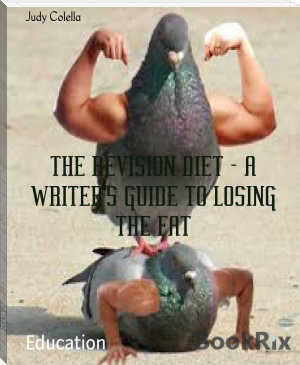THE REVISION DIET - A WRITER'S GUIDE TO LOSING THE FAT - Judy Colella (ink book reader TXT) 📗

- Author: Judy Colella
Book online «THE REVISION DIET - A WRITER'S GUIDE TO LOSING THE FAT - Judy Colella (ink book reader TXT) 📗». Author Judy Colella
DISCLAIMER: This is not a weight-loss guide for your body. The only way you’ll reduce your caloric intake using this book is if instead of eating your lunch, you try to inhale your computer screen.
Hello, fellow writers! I was doing some deep edits on one of my books, and after reviewing all the changes it had gone through, I realized the story had gone from long and ponderous to trim and, well, better. I hope.
Some famous author once made a remark about having to cut out the fat in our writing, and that it was a rather painful process. That famous author was right. I have no idea who that famous author was. Sorry. Anyway, here’s how my book started when I first wrote it in 2008:
ORIGINAL OPENING:
An unexciting, boxy green car came around the corner on two wheels, thumped back onto four after the turn, tore up the straight part of the road, and came to a terrifying, skidding stop in front of the “Park Here” sign. Its driver pounded the wheel with glee, triumphant, his grin huge. He turned to see if the man beside him was as impressed with him as he was with himself, and found instead the bulging eyes of a very distraught individual staring back at him.
Teeth clenched, the driving intructor hissed, “What was that, Giordano?”
The boy’s grin faltered a little. “Uh, I was just showing you I really know how to drive, Mr. Andrews.” It was a good try, but the man’s next words told him it was far from good enough.
“Get out of this car, young man, and go sign up for home economics – it will be safer for everyone. And believe me, Mr. Giordano,” he added, his hands gripping the edges of the seat, “if I ever see you driving toward me, behind me, or beside me on the regular streets, I will promptly steer my car onto the nearest sidewalk to avoid certain death.”
Frank Giordano put the car in park, shaking his head in disgust, and got out. Silence greeted him as he approached the sea of shocked faces where other students stood awaiting their turns. “What? The guy’s got no guts.” Somehow, he couldn’t understand the instructor’s reaction. “Fine.” Giordano picked up his backpack from the sidewalk, scowling now. “I’ll go to a professional driving teacher.” He stomped off into the school building, nearly yanking the glass door off its hinges.
Jacob Andrews waited a few moments until his heartbeat returned to something like normal, then grabbed the clipboard from his lap, noticed that his hands were shaking, and looked at the next name on the list. All he really wanted to do at that point was go home – or to a bar. He turned off the engine, removed the key from the switch, lowered his window and called, “MacDara! You’re next. Hurry up, please.”
Cian MacDara approached the car, trying not to look as nervous as he felt…
_______________________________
As you can see, it’s chock-full of unnecessary words, and some words that no author should use, no matter what – “very,” “really,” and more –ly’s than the State of Virginia (for those who are going, “Huh?” I’m referring to adverb endings that are pronounced “lee”). And then there are the description problems. Since cars are generally inanimate, unless they’re named Christine, they can’t be unexciting. That’s too personification-y. Boxy, yeah, but why bother with that kind of description, especially as a follow-up to the “unexciting” thing?
Back to the computer I went, and came up with this version:
REVISION 1:
A nondescript green car squealed around the corner on two wheels, thumped back onto four after the turn, tore up the straight part of the road, and came to a hair-raising, skidding stop in front of the Park Here sign. Inside, the driver pounded the wheel gleefully, completely triumphant, his grin huge and full of teeth. He turned to see if the man beside him was as impressed with him as he was with himself, and found instead the bulging eyes of a plainly terrified individual staring back at him.
“What,” the driving instructor asked through his own teeth, “was that, Giordano?”
The boy’s grin faltered. “Uh, I was just showing you I really know how to drive, is all.” It was a good try, but the man’s next words told him it was far from good enough.
“Get out of this car, young man, and go sign up for home economics – it will be safer for everyone. And believe me, Mr. Giordano,” he added, his hands gripping the edges of the seat, “if I ever see you driving toward me, behind me, or beside me on the regular streets, I will promptly steer my own vehicle onto the nearest sidewalk to avoid certain death!”
Frank Giordano put the car in park, shaking his head in disgust, and got out. “What?” he said to the shocked students awaiting their turns. “The guy’s got no guts.” Somehow, he couldn’t understand the instructor’s reaction. “Fine.” He picked up his backpack from the sidewalk, “I’ll go to a professional driving teacher.” With that, he stomped off into the school building.
Malcolm Andrews, the instructor, waited a few moments until his heartbeat returned to something like normal. Grabbing his clipboard from his lap, he noticed that his hands were shaking a little, and looked reluctantly at the next name on the list. All he wanted to do at that point was go home – or to a bar. He turned off the engine, removed the key from the switch, lowered his window and called, “MacDara! You’re next. Hurry up, please.”
Cian MacDara approached the car, trying not to look as nervous as he felt…
______________________________________
Okay, somewhat better in spots, but I’d added a lot of new words that made this is ponderous as the original. “…his grin huge and full of teeth?” What? I mean, grins generally are, since our mouths are making them – unless, of course, you’re being grinned at by residents in an assisted living facility for retired boxing champions. And then I make matters worse with the driving instructors reaction: “What,” the driving instructor asked through his own teeth, “was that…” What was I thinking – “…through his own teeth”?! Like whose teeth besides his own would he be asking? I was trying to give the impression that he was speaking through clenched teeth, but because I’d just described Giordano’s, felt that I needed a few words in front of “teeth” to make it less obvious that I’d used that word twice in consecutive sentences. Talk about over-thinking something! I also seemed to have changed the name of the driving instructor from Jacob to Malcolm. Huh?
Then there’s the point of view. Omniscient. I have a bad habit of using that POV in most of my stories, and have used it because I was of the erroneous belief that all my favorite authors used it. To prove it, I went back to one of my favorite books and began to read. To my great amazement, after only two or three pages, I realized I’d been wrong. The reason I thought the writer was using omniscient POV was because while he was only giving the protagonist’s viewpoint, the way he showed the behavior and action of everyone and everything around the main character, I felt as if I knew what they were all thinking, and what was behind the action. So I got two lessons – first, that personal POV, if well-written, gives the reader a seamless inner movie of everything going on; second, what “show, don’t tell” means (finally! I had the hardest time grasping that until that moment).
Back again to the computer. By the way, about three years had passed since that previous revision, and I’d learned a thing or two in the interim. And here’s the result:
REVISION 2:
Careening around the corner on two wheels, a boxy green car thumped back onto four wheels after the turn, tore up the road, and skidded to a stop in front of the “Park Here” sign. The driver, a young man named Frank Giordano, pounded the wheel, his grin huge. He turned to the man beside him with an expectant, self-satisfied look.
Eyes bulging and teeth clenched, the driving instructor hissed, “What was that, Giordano?”
The boy’s grin faltered. “Uh, I was showing you I already know how to drive, Mr. Andrews.”
“Get out of this car, young man, and go sign up for Home Economics – it will be safer for everyone. And believe me, Mr. Giordano,” Jacob Andrews added, hands gripping the edge of the dashboard, “if I ever see you driving toward me, behind me, or beside me on the regular streets, I will steer my car onto the nearest sidewalk to avoid certain death.”
Frank jammed the gearshift into Park, shook his head, and got out. Silence greeted him as he approached the sea of shocked faces where other students stood awaiting their turns. “What? The guy’s got no guts.” Scowling, he snatched his backpack from the sidewalk. “Know what? I’ll go to a professional driving teacher.” He stomped off into the school building, nearly yanking the glass door off its hinges as he went in.
Mr. Andrews waited a few moments, taking deep breaths, then sat back and raised the clipboard from his lap. Hands shaking, he scanned for the next name on the list. “All I want to do right now is go home – or to a bar.” After turning off the engine, he removed the key from the switch, and lowered his window. “MacDara! You’re next! Hurry up, please.” Shaking his head, the instructor closed his eyes and muttered that retirement was beginning to look better and better.
*******
Trying not to look as nervous as he felt…
___________________________________
There. POV fixed. It’s now from the instructor’s, but there are still several problems with how it’s written (for instance, how can Andrews see Frank glaring at the other students?), even though the word count is much lower. But while I went back and pondered my manuscript several times over the three years that followed this revision, I wasn’t sure about how to change it. I knew I had to cut stuff out, but didn’t know what.
And then I decided the biggest problem I was having was the same one all writers have when it comes to self-edits – our stories are like children to us, and we wouldn’t go around cutting off one of our offspring’s fingers or a foot, would we? Of course not. Cutting out words is right up there with amputation of our DNA recipients’ limbs, but with a lot less blood. Still, it’s painful. Yeah, yeah, cutting off a kid’s digits would hurt the kid a lot more than it would the ghoulish parent who would do such a thing, but I’m sure we were all told by a person in authority at one point or other, “Believe me, this is going to hurt me a lot more than it will hurt you.” Liars.
But there it is. I had to get tough. I had to get professional. I had to be like that famous author whose name I can’t remember. It was time to clean house! Woot-woot! Wait. Where did that odd-sounding phrase come from? Whatever. Here’s the final version – never mind that I said, “This is my final edit” more times than Cher said, “This will be my final concert.” I’m running out of time to get this to the publisher, so this has to be it:
TODAY’S REVISION:
Careening around the corner on two tires, the sedan thumped back onto four after the turn, tore up the road, and skidded to a stop in front of the “Park Here” sign. The driver, a young man named Frank Giordano, pounded the wheel, his grin huge.





Comments (0)